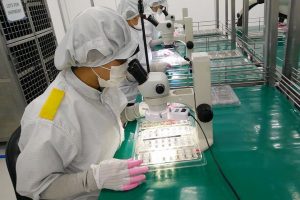THE electronics industry said it remains uncertain about the precise impact of the Regional Comprehensive Economic Partnership (RCEP) on its business prospects, though it is pinning its hopes on more free trade to improve its situation.
Semiconductor and Electronics Industries in the Philippines Foundation, Inc. (SEIPI) President Danilo C. Lachica told BusinessWorld via Viber that the immediate impact of RCEP “is not so visible.”
“The immediate impact is not so visible. (The effect of RCEP) remains to be seen. It is business as usual (for us),” Mr. Lachica said.
“In general though, free trade agreements (FTA) are good for trade. These FTAs reduce trade barriers,” he added.
The RCEP, touted as the world’s biggest FTA since it involves a third of the global economy, is expected to take effect for the Philippines around May after being ratified by the Senate on Feb. 21.
The Philippines was the last participating country to ratify RCEP following concerns about the lack of safeguards for agriculture.
The other participating countries include the remaining members of the Association of Southeast Asian Nations (ASEAN), Australia, China, Japan, New Zealand, and South Korea. The FTA started taking effect in the various jurisdictions on Jan. 1 last year.
Trade among participating countries is expected to increase as RCEP provides minimal to zero restrictions on quantity, tariffs, or import taxes. The government had been pushing for RCEP’s ratification, saying that it would help attract more foreign direct investment.
SEIPI is targeting 5% exports growth for 2023, scaled back from its 10% target in 2022 on the back of slower global demand.
The industry failed to meet its 10% growth target in 2022 even though the value of electronics exports rose 6.88% to a record $49.09 billion, equivalent to 62.27% of Philippine commodity exports.
In early March, Mr. Lachica said SEIPI is counting on demand mainly from the automotive and industrial electronics segments. — Revin Mikhael D. Ochave
